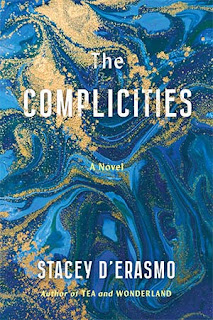 |
| Photo by Sarah Shatz |
Stacey D'Erasmo is the author of the new novel The Complicities. Her other books include the novel Wonderland, and her work has appeared in a variety of publications, including The New York Times Magazine and Ploughshares. She is an associate professor at Fordham University.
Q: What inspired you to write The Complicities, and how did you create your character Suzanne?
A: I was inspired to write The Complicities out of my curiosity about all of the people who are connected to a shady situation, but aren't the main player.
We see this all the time whether it's financial fraud or assault or injustice or lots of other kinds of damage: there may be one person, or a few people, who are in charge of the scene, but often there are many others who are benefiting and participating either actively or passively. I'm very interested in the hearts and minds of those people.
To create Suzanne, really, I just tried to put myself in her shoes. She's not an extraordinary person. She is, I hope, a pretty ordinary person with a slightly different ethical calibration.
Q: In her New York Times review of the book, Lauren Fox writes, “Guilt by association is a thorny concept, especially now, in our ravaged world. How much are we to blame for the many misdeeds, intimate and global, that we may not perpetrate, but from which we benefit? And if we admit culpability, to what extent are we responsible for redress?” How would you describe the relationship between Suzanne and her husband, Alan, and what impact do his actions have on her own?
A: Suzanne, to my mind, does actually love Alan, and she agrees with him that the game is rigged, so it's fair to cheat at it. They are allied in this perspective.
His actions, however, increase the pressure on her to be honest with herself about the consequences of that perspective, and as time goes on, that pressure only increases further. In a sense, what happens with him keeps challenging her to a reckoning that she continually refuses.
Q: What role do you see the whale playing in the novel?
A: To me, the whale is the center of the book. It's very much a real whale, a magnificent creature from another world, and it's a story of its own about the way events go on and on, transforming as they continue to reverberate. The whale keeps changing, and Suzanne is so drawn to it, even though she doesn't really know why. So I hope the whale is simultaneously real, a metaphor, and a mystery.
Q: The novel takes place in a small town in Massachusetts, where Suzanne retreats after Alan's misdeeds are uncovered. How important is setting to you in your writing?
A: Setting always matters. It's as much a character as any person in the book. I spent some time going to small towns in Massachusetts like the one I describe, scribbling down details and vibes. Places, like people, aren't interchangeable.
Q: What are you working on now?
A: I'm working on a nonfiction book about the lives of various writers and artists.
Q: Anything else we should know?
A: I know a lot more about whales now than I did before I started this book.
--Interview with Deborah Kalb. Here's a previous Q&A with Stacey D'Erasmo.

No comments:
Post a Comment